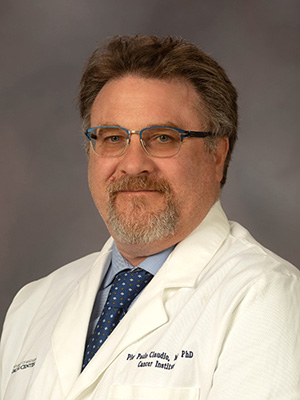Investigator Highlight: Dr. Pier Paulo Claudio

Dr. Pier Paulo Claudio, professor of biomolecular sciences and a research professor in the National Center for Natural Products Research at the University of Mississippi, is a surgeon who chose to focus on lab research. His career has focused on cancer therapy, either providing it or searching for better ways to do so.
How long have you worked with your current organization and what type of research do you do?
I have been a Cancer Center and Research Institute member for the past seven years. My research focuses on bridging cancer research performed in the laboratory to clinical practice. This is called translational research, which aims to provide the missing link between laboratory benchwork and healthcare. The interest of my laboratory has been to translate discoveries made in my laboratory to clinical practice by raising the interest of faculty, fellows, residents and medical students at the university and by collaborating with various colleagues at other institutions. I also collaborate with various industries to advance their discoveries to clinical practice by conducting targeted experiments to address specific questions.
Would you describe your most recent research and/or publications?
The main focus of my research has been threefold:
1) to determine, in collaboration with several institutions around the USA, the clinical validity of a test we developed in the laboratory that is called ChemoID. The test acts as a predictor of clinical response based on the sensitivity of cancer stem cells (CSCs) to conventional chemotherapies. The CSCs have been in recent years recognized as the root of cancer and responsible for cancer recurrence and metastatic spread. Treating cancer patients with chemotherapies that are more effective on an individual basis at eliminating the CSCs proved to prolong their survival and achieve better responses.
2) to advance, in collaboration with Dr. Candace Howard, associate professor of radiology and vice-chair for radiology research at UMMC, a novel image-guided gene therapy system. We use ultrasound contrast agents to target and deliver drugs or viruses armed with anticancer genes to fight therapy-resistant cancers. Our ability to incorporate drugs or viruses armed with anticancer genes into site-targeted nanosystems represents a new paradigm in therapeutics that we hope will usher into a new era of image-guided drug delivery.
3) to develop in collaboration with Dr. Omar Chohan, associate professor of neurosurgery and neurosurgeon at UMMC, a new test that is intended to help us predict the role of immune-checkpoint inhibitors in metastatic carcinomas of the brain. This test will be hopefully used in the near future as a predictor of clinical response to immunotherapies.
How does your recent research and/or publications relate to your overall research within cancer?
The focus of my research has always been to understand the molecular mechanisms governing malignant transformation to tailor novel therapeutic strategies. Toward this end, I have carried out in the past 25 years studies to understand the crosstalk between those factors that contribute to cancer progression versus those that protect from it. With the advancement of precision oncology, an increasing number of novel therapies are being developed.
The research in my laboratory is aimed at improving personalized anticancer therapy by:
- More effectively targeting cancer stem cells, which ultimately leads to better outcomes;
- Challenging cancer with image-guided therapy modalities to more precisely deliver anticancer drugs;
- Developing novel assays able to better predict clinical response to immunotherapies.
What inspired your most recent research and/or publications?
Although I was originally trained to be a surgeon, I discovered at a young age that I had a passion for cancer research that led me to devote my entire career to searching for better ways to treat cancer patients. I felt early on that as a surgeon I could help one patient at a time, and that moved me to put my efforts into research instead. I want to contribute to a cure for cancer, one that is cost-effective and available to cancer patients worldwide especially those with healthcare disparities.
What advice can you give medical students and/or high-school students who are interested in pursuing a career in research?
Fresh ideas come from young productive minds able to imagine and develop new concepts. To be successful, my advice is to get involved in research at a young age. Find your interest, and don’t be shy to write an email to request to participate in research activities that may interest you. Explore the many opportunities that are out there and find a mentor that can guide you through the process.


